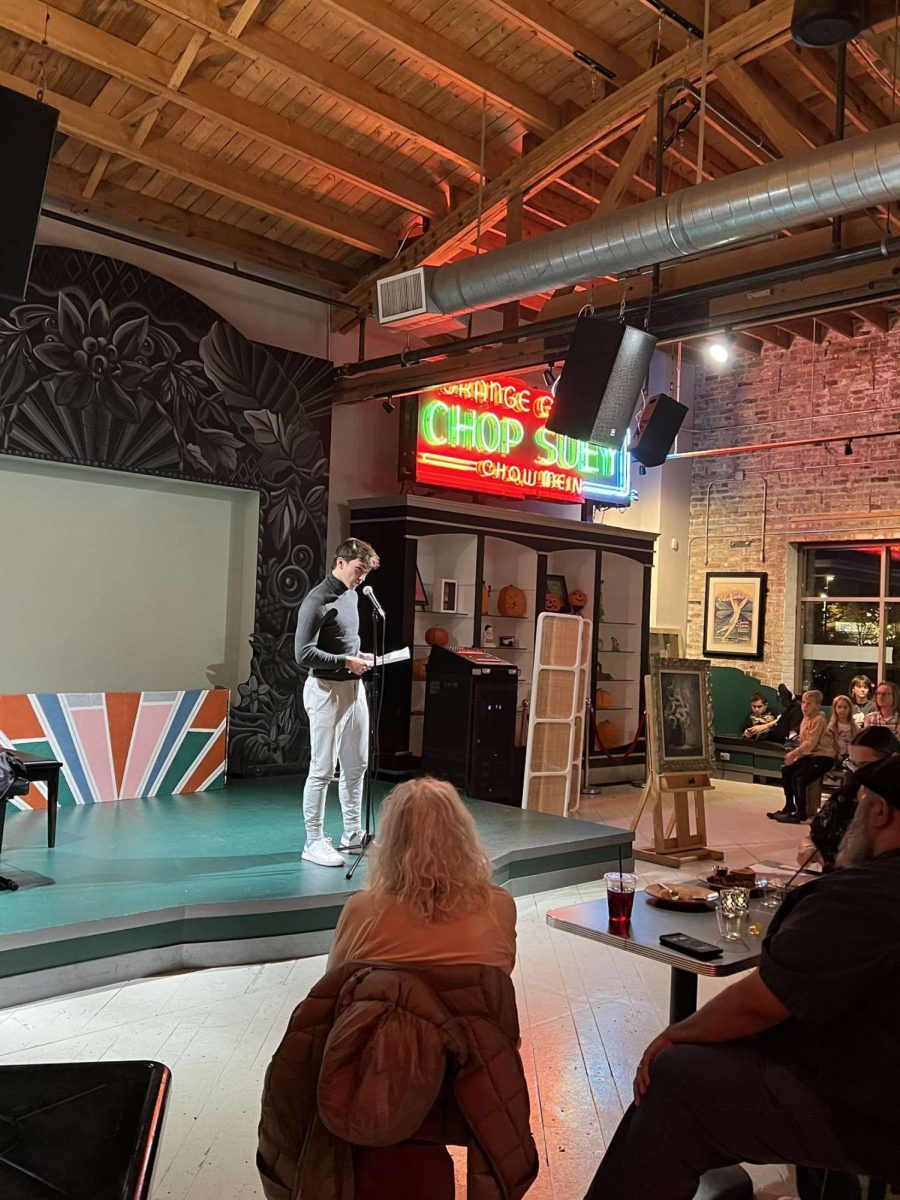On Thursday Nov. 9, Highland Park cafe Madame Zuzu’s hosted a charity poetry reading, raising money for Glencoe Youth Services through ticket sales and donations. Students from local high schools like New Trier, Highland Park, and North Shore Country Day read their work, along with their teachers. Regular volunteers with Glencoe Youth Services’ young adult special needs pal program read their poems as well.
Glencoe Youth Services aims to empower local youth to be more involved in the community through fun outreach activities and service products. They call middle and high school students to action through events including making bagged lunches for the homeless and candy bags for veterans. The poetry reading gives local students a platform to express their emotions and share their work in a safe yet challenging environment.
“This is just a great way to connect more people in the community — to connect artists,” Michelle Rosenthal, director of Glencoe Youth Services, said. “It’s one thing to be an artist and to create in isolation and in a private setting. When you go out into the community it becomes a totally different thing.”
Though this was only the second time Madame Zuzu’s hosted a student centered poetry reading, an adult group called Highland Park Poetry hosts monthly readings at the restaurant. The youth event has only increased in popularity since the first time it was held — the restaurant plans to host another reading in the near future. Not only have the readings united the community, but they have brought together artists of all ages and backgrounds.
“When artists are able to connect, great things come out of it,” Rosenthal said. “One [outcome] is just better work.”
In addition to providing a platform for artists, the poetry reading gives students the unique opportunity to share with their peers and adults alike. New Trier English teacher and Poetry Club sponsor John O’Connor could not have been more thrilled for his students to put themselves out there.
“So much writing that we do in school can feel artificial because the teachers read it,” O’Connor said. “This is a chance to write for people who are not the teacher and to write in a way that is more emotionally affecting than thesis-driven essays are.”
After COVID-19, it grew increasingly more difficult for students to break out of their shells and share their work. The poetry reading offers willing students a platform to share their work in an authentic, welcoming, and safe environment.
Ultimately, in addition to helping students find their voices and role in the community, this poetry reading aimed to reestablish a tradition and bring back a sense of normalcy from pre-pandemic times.
“Part of our mission is to let people know that this is ongoing and there are poetry readings all over the world. This is not just for students and it is a routine part of many peoples lives. Pre-pandemic I went to dozens of poetry readings a year, almost none of them with students there,” O’Connor said. “Poetry is a living breathing art form that is expanding everyday. Live poetry readings help enforce that.”
New Trier senior Brianna Locke was one of many students to read their writing at Madame Zuzu’s. Though it was not her first time sharing her work with an audience, this was a unique experience.
“I read at one other event that was much smaller at the Book Stall in the spring,” Locke said. “I liked that event, but I was interested in something that was a little bigger, with both more writers and more audience members. Madame Zuzu’s was a perfect opportunity to get that size up but still be something casual.”
Her experience has helped her read her audience better and taught her to pick a poem she knows they will like.
“There’s that interesting balance of choosing something that you’re comfortable sharing with peers and teachers that at the same time has artistic value for audience members,” Locke said. “With an audience [like] Madame Zuzu’s, you have to find pieces that are universal enough to be relatable to all kinds of people that might be in the audience.”
Though it can be scary or seemingly embarrassing to share writing with an audience, Locke has found it to be very meaningful.
“In my experience, [fear and embarrassment] are overpowered by the desire to share work that you’re really proud of and want people to hear,” Locke said. “[Reading at events] really builds your confidence in your ability to put your writing out there, and it definitely gets easier with time and practice.”
Locke believes that, not only is it important to write on your own, but true growth comes from sharing your work and collaborating with others.
“To anyone hesitant to share your poetry, there are audiences out there excited about your art, if only you’re willing to seek them out,” Locke said.








































